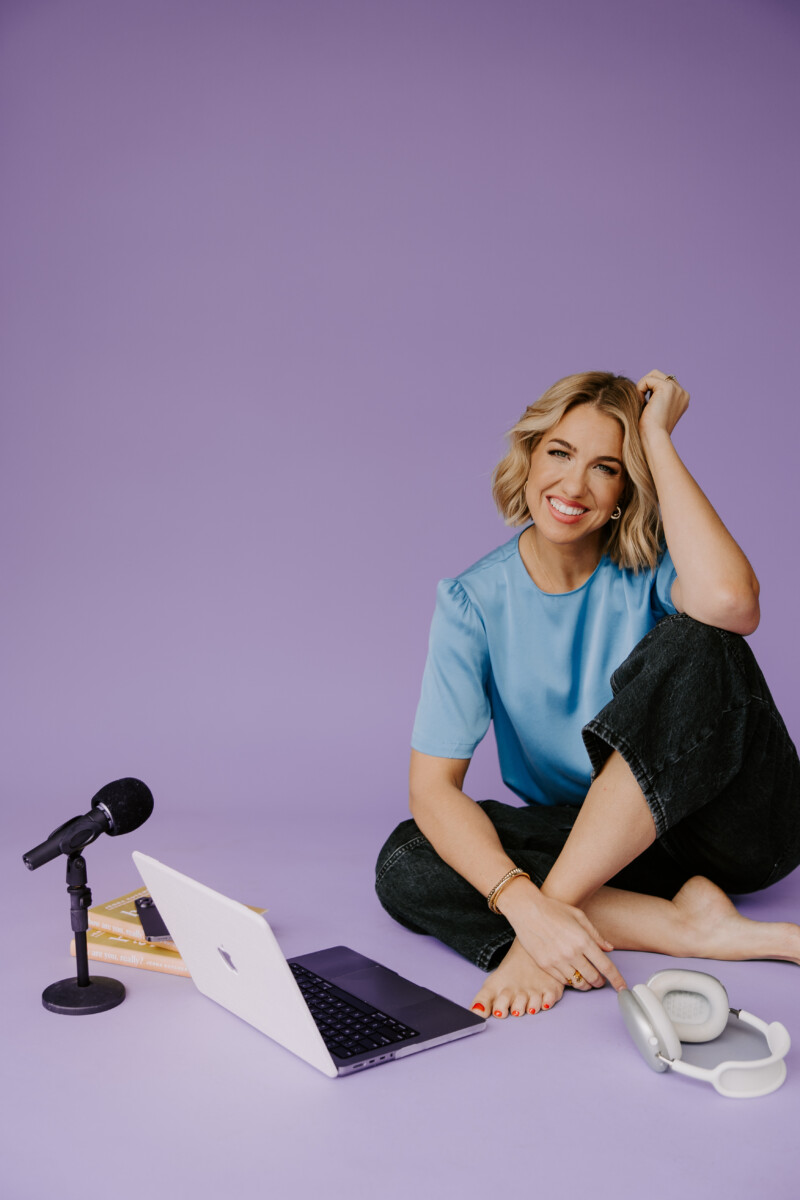
If the thought of starting your own podcast has ever danced across your mind, I know often the next thought is, “But I could never.” Podcasts are this amazing medium where you can hold conversations, talk to listeners like friends, interview people you admire, and share raw insights and true stories that bring people together. But so many people tend to get held up before even starting because they feel overwhelmed by the amount of hoops to jump through just to get started. And often because they feel they just don’t have the time.
Well, allow me to simplify things for you and share EXACTLY what you need to launch your podcast. Spoiler: It isn’t some 10-year business plan or expensive tech setup. While there are a few different pieces you’ll need to coordinate, I promise none of them are inherently complicated or scary. Just tackle them one at a time, and know that podcasting is a low time commitment in the grand scheme of things. You can spend 2 hours or less recording and prepping episodes each week (if your topic isn’t research-heavy) — and that’s doable for just about anyone!
So let’s get you set up for success with the 5 things you’ll need to have to launch your podcast. And keep in mind… you can change just about all of these down the line! So don’t let decision-making keep you frozen from moving forward. Go with your gut, make quick but informed decisions, and keep shimmying on ahead!
1. Pick your podcast name
Did you know this is the ONLY detail that hasn’t changed for my podcast over the years? Everything else about the Goal Digger podcast has adapted and changed as I entered new seasons of life and business: the show art, the way we prep episodes, my recording mic and set-up, the frequency of episodes we release (we went from 1 episode per week to 2 a few years ago)!
I know picking the title of your show feels like a BIG deal — and it is to a certain extent! You want it to be interesting, alluring, specific enough to cover your niche, not taken by anyone else, and broad enough that it allows you to adapt the show as time goes on if necessary. Whew… it’s enough to cause anyone to feel like they’re wearing 500-pound shoes.
My recommendation? When you’re feeling inspired, write down a list of all the potential names and even words that you might associate with your show. Play with different combinations and formations of titles/words. Then, pick your top 5 FAVORITE name options. From those, if you don’t have a really clear favorite, ask for feedback! Get input from family, friends, followers… anyone you trust!
And know that even THIS is something you can change later on! So choose what feels most right in the moment and keep on going.
2. Create artwork for your show
This is the little square graphic icon that everyone sees when they scroll through their podcast app. Even if you’re not a designer, you can hire this out from a graphic designer for a pretty affordable price or do it yourself using a template on a free design platform like Canva.
You want your show art to:
- Be easy to read: the icons are usually really small on someone’s phone, so make sure the text is large enough for people to read
- Have an eye-catching photo: photos say so much more and connect with people quicker than just words on a graphic
- Include your name if the show is different from the title: a short subhead that says “by [your name]” under the title will help people gain recognition of you, the host, quicker!
3. Figure out what podcasting equipment you’ll need
Yes, you need a little equipment but no, it doesn’t need to be fancy! No lie, I started with iPhone headphones and that’s it. I recorded in my car, parked in my garage, no less. No mic, no fancy Bluetooth headphones. One of my friends has a top-rated show that gets thousands of downloads each week and he just opens up the voice memo app on his phone and records his thoughts as he drives into work.
If you want to get a mic, there are tons of more affordable ones online — just read reviews to see other people’s experiences with it! I now have a microphone set up that’s easy to use, but I stand firmly by the notion that the message matters more than the method! Do your best to have decent sound quality, but don’t let that be the reason you don’t hit record. You’ll get better and savvier over time, I promise.
4. Record an episode (or a few)
So often, people get caught up in ALL the details around the thing, that they don’t do the one thing that will give them results. For your podcast, the one thing you need to do is hit record! That’s it! The best part? You can sit down and record a little batch — I promise you’ll get even better as you go! I recommend launching with more than one episode to let people binge and get a feel of the show beyond just one sneak peek! I launched with four!
It also helps you to get your feet wet, learn the show format you like, figure out what feels natural and what doesn’t work, and work out some of those early kinks. It also creates momentum because I truly find it thrilling and motivating to share with others in this medium that’s so different from others! You’ll want to keep going and creating once you get a few episodes under your belt!
5. Write strategic episode descriptions
Trust me, if you want people to tune in, you’ve got to communicate why they should hit play! Your episode descriptions are more important than you might think. They’re how new listeners might find your show if you leverage the right keywords (think: include keywords and phrases that people would type into the search bar of their podcast app). Also make sure to include any links you mention in the episode, and have some sort of call-to-action if you can (even if it’s just for people to rate, review, and subscribe). People are always going back to the beginning of your show so being intentional here is helpful if possible.
There you have it! The 5 things you need to launch a podcast. Can you see that it doesn’t have to be time-consuming, confusing, or overwhelming? I want to remind you that most of these things can (and will) change and evolve over time as you get the hang of it, so make decisions for now and know that as you gain experience and feedback, you’ll naturally evolve into an even better podcaster!




